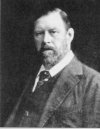 |
Bram Stoker1847-1912 |
 |
Bram Stoker1847-1912 |
Abraham (Bram) Stoker werd op 8 november 1847 geboren in Clontarf, Ierland.
Getergt door verscheidene kinderziektes had Bram, de eerste zeven jaar van z'n leven, veel tijd om te lezen.
Een paar jaar later ging Bram naar Trinity College in Dublin. Ondanks een spraakachterstand werd hij erestudent. Hij was betrokken bij verschillende literaire en theater activiteiten, speelde o.a. voetbal en was marathon kampioen.
Na z'n exames ging Bram net als zijn vader werken als ambtenaar in Dublin Castle.
In 1871 begon Bram's literaire carriére. In dat jaar ging hij onbetaald werken als theatercriticus voor de "Evening Mail" en begon hij korte verhaaltjes te schrijven.
Bram's eerste succes kwam een jaar later toen de "London Society" een kort verhaaltje "The Crystel Cup" van hem pulbliceerde. In 1875 schreef Bram een 4-delige fictie reeks genaamd "Chain of Destiny". De thema's voor deze reeks waren horror gecombineerd met romantiek, nachtmerries en duistere vloeken. De combinatie van deze elementen werden het kenmerk van Bram Stoker.
Tien jaar na Trinity College, werd Bram herenigd met z'n vriend Henry Irving. Henry speelde in het stuk "Hamlet" waarover Bram een review moest schrijven.
Onder de indruk van de zeer gunstige review, nodigde Henry, Bram uit om Backstage te komen.
Er ontstond een hechte vriendschap.
In 1878 nam Henry zijn eigen theater over en vroeg Bram om het management op zich te nemen. Bram nam ontslag als ambtenaar en werd manager van de "London Lyceum".
Kort nadat hij aan z'n nieuwe carriére was begonnen, nam de uitgeverij "Sampson & Lowe" contact op met Bram.
In 1891 werd "Under the Sunset" gepubliceerd, een boek dat door vele goed werd ontvangen.
Toen het boek "The Snake's Pass" in 1890, goede kritiek opleverde voor Bram, was hij al een tijdje bezig met notities maken voor een boek met Vampieren als thema. In Juni 1897 werd "Dracula" gepubliceerd.
De review's over "Dracula" waren verschillend, het boek werd vergeleken met "Frankenstein".
Dracula heeft Bram nooit echt veel geld opgeleverd.
Een paar jaar na het succes van "Dracula" ging het slecht met zowel Bram als Henry. Er waren financiële problemen en het theater brandde voor een groot gedeelte af. Henry moest met theater verkopen.
Het lukte Bram nog wel om in 1903 het boek "The Jewel of the seven Stars" te publiceren. Het boek is gebasseerd op de verhalen van een Egyptoloog.
In 1905 overleed Henry Irving.
Aangegrepen door de dood van z'n goede vriend schreef Bram een jaar later het boek "Personal Reminiscences of Henry Irving".
Bram Stoker heeft tot z'n dood, nog een aantal boeken geschreven.
Hij overleed, 20 April 1912, op 64 jarige leeftijd.
Having some time at my disposal when in London, I had visited the British Museum, and made search among the books and maps in the library regarding Transylvania; it had stuck me that some foreknowledge of the country could hardly fail to have some importance in dealing with a noble of that country. I find that the district he named is in the extreme east of the country, just on the borders of three states, Transylvania, Moldavia and Bukovina, in the midst of the Carpathian mountains; one of the wildest and least known portions of Europe.
I was not able to light on any map or work giving the exact locality of the Castle Dracula, as there are no maps of this country as yet to compare with our own Ordnance Survey maps; but I found that Bistritz, the post town named by Count Dracula, is a fairly well-known place. I shall enter here some of my notes.
In the population of Transylvania there are four distinct nationalities: Saxons in the south, and mixed with them the Wallachs, who are the descendants of the Dacians; Magyars in the west, and Szekelys in the east and north. I am going among the latter, who claim to be descended from Attila and the Huns. This may be so, for when the Magyars conquered the country in the eleventh century they found the Huns settled in it.
I read that every known superstition in the world is gathered into the horseshoe of the Carpathians, as if it were the centre of some sort of imaginative whirlpool; if so my stay may be very interesting . . .
From the Introduction of Dracula, 1897